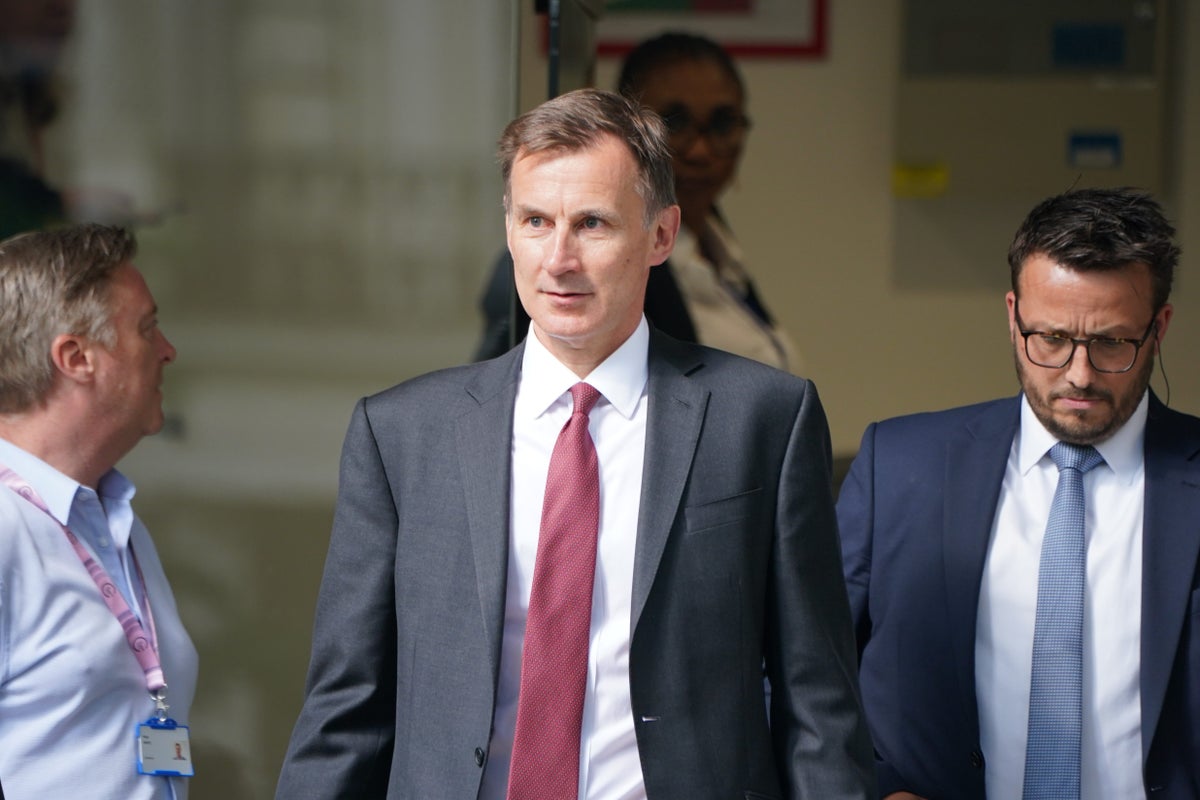
Jeremy Hunt will say he is prioritising tackling inflation over tax cuts, in a blow to Tory MPs clamouring for a pre-election giveaway.
In his first Mansion House speech as Chancellor on Monday, he will say that bringing down soaring prices “puts more money into people’s pockets than any tax cut”.
The comments will further alarm Conservatives who have been pressing for reduced taxes to help drive economic growth and win over voters, as the party trails Labour in the polls.
Bringing down inflation puts more money into people’s pockets than any tax cut— Jeremy Hunt
Before setting out longer-term reforms to make UK capital markets more attractive, Mr Hunt will say there can be no sustainable growth without abolishing inflation.
Rishi Sunak wants to halve inflation to about 5% by the end of the year, but the rate has stubbornly remained at 8.7%.
Mr Hunt is expected to say: “In January, the Prime Minister made halving inflation this year the first of his five priorities. Delivering sound money is our number one focus.
“That means taking responsible decisions on public finances, including public sector pay, because more borrowing is itself inflationary.
“It means recognising that bringing down inflation puts more money into people’s pockets than any tax cut.
“And it means recognising that there can be no sustainable growth without eliminating the inflation that deters investment and erodes consumer confidence.
“Tackling inflation therefore unlocks the Prime Minister’s other two economic priorities – growing our economy and reducing debt – but because it is a prerequisite for both, it must come first.”
The Treasury chief has previously appeared to rule out major tax cuts this autumn, despite some Tories demanding them before the next election, due by January 2025.
In his set-piece address to the City of London, Mr Hunt will promise a £1,000-a-year pensions boost to the average earner with reforms to get pension funds making riskier investments in high-growth firms.
He said there is a “perverse situation” in which UK institutional investors are not putting as much money into UK start-ups as their international counterparts, with defined contribution pension schemes investing 1% in unlisted equity, compared to around 6% in Australia.
He will hail an agreement with leading pensions firms to put 5% of their investments into early-stage businesses in the fintech, life sciences, biotech and clean technology sectors by 2030.
The changes, dubbed the Mansion House Reforms, could help increase the retirement savings of a typical earner who starts saving at 18 by 12% over their career, or over £1,000 more a year once they stop working, according to the Chancellor.
It could also unlock £50 billion of scale-up investment if the rest of the industry follows suit.
Aviva, Scottish Widows, Legal & General, Aegon, Phoenix, NEST, Mercer, M&G and Smart Pension are so far taking part.
Pensions firms welcomed that Mr Hunt was not making the move mandatory, as the industry had warned against.
They will be expected to make investment decisions “on the basis of long-term returns and not simply cost”, while underperforming pension schemes will be wound up by the regulator as part of consolidation measures, Mr Hunt will also say.
The Government will also incentivise investment vehicles to enable schemes to put money into unlisted companies.
The Lord Mayor of the City of London, Nicholas Lyons, said he is “proud to have convened key industry players to make this commitment” to allocating more assets to unlisted equities.
He will say in a speech that the move “will ensure high-growth firms in sectors like fintech and biotech can stay and scale in the UK, and support the development of much-needed new sustainable infrastructure in areas of the country that have felt left behind, while improving the retirement incomes of millions of UK pension savers.”
Mr Hunt will pledge to prioritise a “strong and diversified” gilt market, meaning he will not force firms to favour riskier investments over the low-risk ones offered by the Government.
He will also set out a “golden rule” of never making changes that “compromise” the UK’s position as a leading financial centre.
The Government will consult on doubling the existing local government pension scheme allocations in private equity to 10%, and accelerating the transfer of their assets into pools exceeding £50 billion.
The Chancellor will also set out plans to make London the “global capital for capital”, including by simplifying the prospectuses companies must produce to raise cash.
He will announce the repeal of nearly 100 pieces of retained EU law for financial services to streamline the UK’s regulatory rulebook.
GlaxoSmithKline chairman Sir Jonathan Symonds said: “The changes will help increase investment returns for pension savers through improved access to all asset classes including in high growth sectors, and ensure the UK’s most innovative companies are better supported by UK capital to stay in this country as they scale to maturity.”
Brent Hoberman, co-founder and executive chairman of the Founders Forum, said: “This should be welcome news to the UK industries of the future, their ability to attract more capital will create more national champions and generate growth, jobs and increased tax revenue.”







